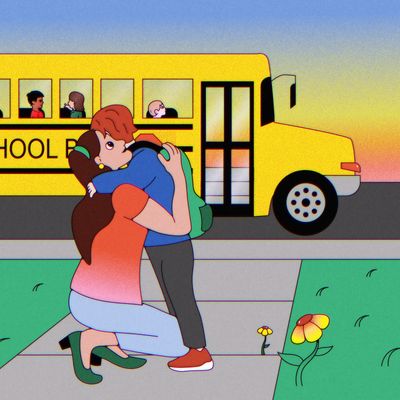
Dear Emily,
I have a very sensitive, sweet, shy 6-year-old who sometimes struggles with standing up for himself. When my kids were toddlers it was very easy for me to jump in and intervene if another kid was being a jerk at the playground. But now that my oldest is in school I can’t be there to help in the same way. I’ve recently learned that there’s a kid in my son’s class, who is also a neighbor, who’s been picking on him, including getting physical at times. It’s very clearly affecting my son’s mood and how he feels about school. We live in a small, tight-knit community, and I worry that chatting to the kid’s mom will be poorly received and that it could make things worse for my son, but I also feel like doing nothing is letting him down. Of course, my instinct is to rage, but I’m trying to be a little more rational about it. What should I do?
— Bullied
Dear Bullied,
Your letter brought up a painful childhood memory for me of being bullied when I was a little older than your son. What was so memorable about the experience for me wasn’t the bullying itself, which was humiliating and annoying but probably something that I would have gotten over quickly. What made the situation memorable was my mom’s reaction. Instead of offering compassion when I told her one of my classmates had bullied me, she asked me what I’d done to provoke such a thing.
It was an offhand reaction, and to be honest, it’s something I can now easily imagine myself thoughtlessly saying to one of my own kids as I half-listen while scrubbing strawberry residue out of a lunchbox compartment or picking balled-up socks off the floor. That right there is the hideous and also kind of great thing about parenting: It makes you feel compassion for your own parents, who were just doing their best to navigate the maelstrom of daily chores and tasks and feelings and desires that running a household entails. I don’t blame my mom for reacting the way she did — unlike your son, I was a feisty kid, and I’m sure I did do something to provoke my bully! But I remember that she asked me what I’d done before offering support for how I was feeling about what had happened. Because of that memory, I’ve resolved that when my kids come to me with their tales of being wronged at school or on the playground — which happens all the time now that they’re both in grade school — I listen and sympathize first, then attempt to be as diplomatic as I possibly can while I try to ascertain what really happened. I don’t assume they’re blameless, but I try to act as if I do. I make it clear that I’m taking their side in whatever conflict they’ve just experienced. I want them to know that I am their advocate when they feel wronged, and whether they are also partially in the wrong is a tertiary concern, something to be discussed after all the initial hurt feelings are smoothed over and a plan of action has been arrived at.
What I’m saying is that the most important thing you can do, regardless of whether you end up speaking to the other kid’s mom or, maybe more important, to his teacher, is to let your kid know you’re on his side and provide a compassionate sounding board for him when he needs to vent about the experience of being picked on. After that, once you’ve thought through a non-ragey way to do so, I encourage you to talk to his teacher, who has a better chance of witnessing the behavior in real time and being able to do something about it than the other parents do.
That’s not to say I’d shy away from talking to your neighbor — why not just neutrally make sure she knows what’s going on? Maybe she has no idea that her son’s been acting out in this way. I don’t think it’ll make the situation worse, though of course it may be awkward. Just try to keep the interaction as short and fact-based as possible: “Hey, here’s what’s been happening. I just wanted you to know.” I don’t think it’s likely that talking to your neighbor or to the teacher is a fail-safe bullying ender, but if you take these steps, you’ll at least know you’ve done everything in your power to try to help your kid. Annoyingly, the real work here is just standing by him as he feels his way through a situation that sucks and that you ultimately have little control over. This is, I’m sad to say, one of the cardinal experiences of having school-age kids. We can control some things, like maybe 75 percent of the things that happen under our own roofs. But there’s so much every day that happens outside our control, and all we can do about it is be there to listen and let our kids know we’re there for them and are a bastion of safety and care in their worlds.
It may be that the solution here is as simple as talking to the teacher and making sure the two kids sit further away from each other, or identifying the particular situation in which the kid is picking on your son and then making sure it’s avoided or supervised. And, of course, your innocent shy guy is going to inevitably learn something via this experience, though it’s a tossup what his takeaway will be behavior-wise. I don’t think being told to stand up for yourself ever works, really. It’s more like this situation might prompt a slow evolution for him into being a slightly different kind of person, maybe one who responds to bullyish behavior with evasive maneuvers or clever insults or whisper campaigns. Again: even more stuff beyond your control. But one thing he’ll never doubt, regardless of what happens with this one obnoxious kid, is that your love and support are always there for him. It doesn’t feel like enough, but it’s also everything.
Have a question for Emily? Email askemily@nymag.com (and read our submission terms here.)
More From This Series
- ‘I Can’t Stand My Husband’s Gross, Messy Family’
- ‘The Economy Ruined My Relationship’
- ‘Help! My Son’s Friend Doesn’t Know How to Use the Bathroom’





